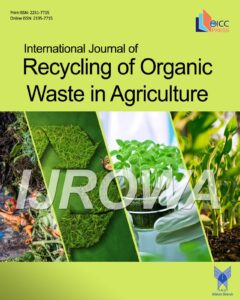Physico‑chemical and microbiological quality of M’Zar wastewater treatment plant effluents and their impact on the green irrigation of the Golf course
Authors
Abstract
Purpose Reuse of treated wastewater (TWW) for irrigation can be an effective strategy in Morocco to overcome the pressure on freshwater resources. The M’zar wastewater plant is based on percolation infiltration treatment, allowing the purification of the wastewater of Agadir, and with its UV disinfection system, it is now possible to reuse this water for irrigation. In this sense, the aim of our study is to evaluate the microbiological and physicochemical quality of the treated wastewater of this station, used for irrigation of a Golf course as well as to determine its impact on grass and soil.
Methods A monitoring of TWW quality was carried out monthly on the level of the Ocean’s Golf on water samples, grass and soil. This monitoring is related to the physicochemical (pH, temperature, conductivity, STD, COD, and BOD5) and bacteriological characteristics by counting the indicators of faecal contamination, faecal coliforms (FC), faecal streptococci (FS), Salmonella and Vibrios as well as sulphito-reducers spores (SRS).
Results The results of microbiological analysis in the three compartments confirm the presence of various organisms such as FC, FS, and SRS in a very significant number with no load in Salmonella and Vibrios during our study period. For physicochemical analyses, we observed that only the conductivity showed fairly a high value of 6.38 dS/m.
Conclusion The obtained physicochemical and bacteriological results revealed that the treated wastewater with the M’zar plant complies with national and international standards.




